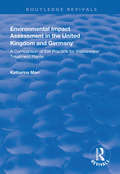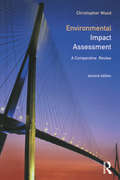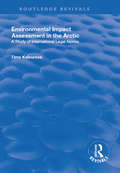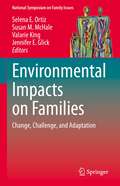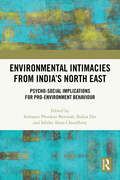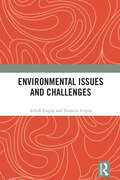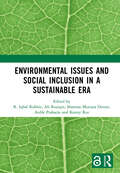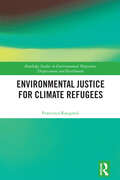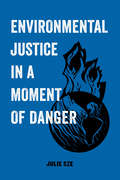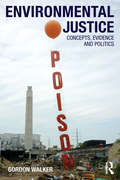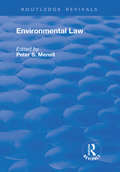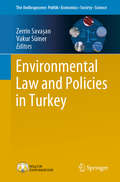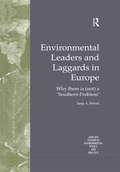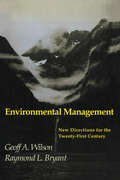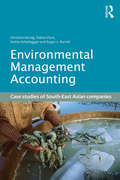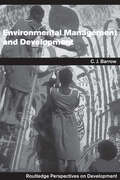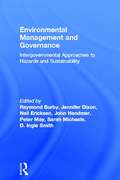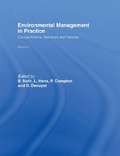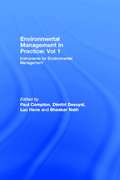- Table View
- List View
Environmental Impact Assessment in the United Kingdom and Germany: Comparision of EIA Practice for Wastewater Treatment Plants (Routledge Revivals)
by Katharina MarrFirst published in 1997, this volume examines wastewater treatment plants in the UK and their counterparts in Germany in the wake of the International Study of the Effectiveness of Environmental Assessment (1996). Having originated in the United States National Environment Policy Act of 1969, the basic concept of EIAs has been adopted around the world and are highly diverse today. This study aims to examine, compare and suggest improvements for EIA practices as applied to wastewater treatment in the UK and Germany.
Environmental Impact Assessment: A Comparative Review
by Chris WoodEnvironmental Impact Assessment (EIA) has become a vital management tool worldwide. EIA is a means of evaluating the likely consequences of a proposed major action which will significantly affect the environment, before that action is taken.This new edition of Wood's key text provides an authoritative, international review of environmental impact assessment, comparing systems used in the UK, USA, the Netherlands, Canada, the Commonwealth of Australia and New Zealand and South Africa.
Environmental Impact Assessment: A Guide To Best Practice (Routledge Revivals)
by Timo KoivurovaThis title was first published in 2002. This volume examines the norms of international law that apply to the planning stage of large-scale activities such as hydrocarbon exploitation, mineral extraction and forestry. These stationary activities (those that remain at a single location for a period of time), pose grave risks to the Arctic environment, since the development of technology has made it profitable to exploit natural resources even in such harsh regions.
Environmental Impact Assessment: Theory and Practice
by Peter WathernThis comprehensive treatment of environmental impact assessment (EIA) provides an authoritative contemporary review of theory and practice over the past ten years. EIA is viewed as both science and art, reflecting the concern both with technical aspects of appraisal and the effects of EIA on the decision-making process. Adopted in many countries, with different degrees of enthusiasm, since its inception in the early 1970's, EIA is established as a major procedure for assessing the environmental implications of legislation, the implementation of policy and plans and the initiation of development projects. EIA is increasingly an essential part of environmental management
Environmental Impacts on Families: Change, Challenge, and Adaptation (National Symposium on Family Issues #12)
by Valarie King Susan M. McHale Jennifer E. Glick Selena E. OrtizThis book examines ways in which families’ physical environments have implications for their relationships and the health and well-being of their members. Attention is given to three aspects of the physical environment—disasters, climate change, and the built environment—and the challenges these may create for families. Chapters describe particular considerations within each of these three physical environment challenges, the ways they affect families, and factors that protect families, promote their resilience and enable them to flourish. Finally, the volume offers recommendations for the role of government programs and policies to support families to overcome and/or adapt to environmental challenges as well as highlights the efficacy of evidence-based interventions aimed at promoting family resilience.Featured areas of coverage include: Extreme natural events and families’ postdisaster recovery.Family adaptations to climate change.The built environment and children’s health and well-being.Community-driven approaches to address environmental inequities.The urban environment of family caregiving. Environmental Impacts on Families is a must-have resource for researchers, professors, and graduate students as well as clinicians, therapists, policymakers, and other related professionals in developmental psychology, family studies, environmental health and policy, social work, public health, educational policy and politics, economics, migration studies, and all interrelated disciplines.
Environmental Intimacies from India’s North East: Psycho-Social Implications for Pro-Environment Behaviour
by Indranee Phookan Borooah Sabiha Alam Choudhury Bidita DasThis book explores the intimate relationship of the people of North East India with the environment as evinced from their traditional beliefs, cultural practices, and livelihood. It offers insights into the challenges and adaptability of communities through actions ensuring conservation of the environment yet sustaining their livelihood.The book encompasses movement toward responsible actions and the engagement of communities in pro-environmental behavior. It showcases the various practices, knowledge, and debates on the environment-behavior relationship of the people of North East India. It brings into focus some of the daunting environmental issues and the endeavors for sustenance that is true to a region which is rich in ecological diversity and touches the spirit and psyche of its people.This volume will be of interest to scholars and researchers of psychology, anthropology, sociology, environmental sciences, development studies, law and governance, environmental administration, and South Asia studies.
Environmental Issues and Challenges
by Abhik Gupta Susmita GuptaThis book explores the field of environmental studies emphasizing its multidisciplinary nature. It looks at the fundamentals of environmental conservation and the management of sensitive ecosystems. The book provides an overview of the basic concepts used to understand and study diverse ecosystems and their functions as well as the progressively larger yet mutually inclusive units, such as the landscape and the biome. It examines the challenges towards preserving biodiversity which is under severe threat due to climate change, exploitation of natural resources, pollution, and man-made disasters. Besides outlining the causes and effects, the authors outline control mechanisms to keep pollution within safe limits and offer suggestions for resolving issues such as wildlife poaching and trade, water and air pollution, deforestation, and biodiversity loss through policy changes. This book will be of interest to the students, researchers, teachers of environmental studies, environmental science, sociology, political science, and public administration. This book will also be useful to environmentalists, wildlife conservationists, and policy makers.
Environmental Issues and Challenges
by Abhik Gupta Susmita GuptaThis book explores the field of environmental studies emphasizing its multidisciplinary nature. It looks at the fundamentals of environmental conservation and the management of sensitive ecosystems.The book provides an overview of the basic concepts used to understand and study diverse ecosystems and their functions as well as the progressively larger yet mutually inclusive units, such as the landscape and the biome. It examines the challenges towards preserving biodiversity which is under severe threat due to climate change, exploitation of natural resources, pollution, and man-made disasters. Besides outlining the causes and effects, the authors outline control mechanisms to keep pollution within safe limits and offer suggestions for resolving issues such as wildlife poaching and trade, water and air pollution, deforestation, and biodiversity loss through policy changes.This book will be of interest to the students, researchers, teachers of environmental studies, environmental science, sociology, political science, and public administration. This book will also be useful to environmentalists, wildlife conservationists, and policy makers.
Environmental Issues and Social Inclusion in a Sustainable Era: Proceedings of the 2nd International Conference on Humanities and Social Sciences (ICHSOS 2022), Malang, Indonesia, 1-2 July 2022
by Ali Roziqin Shannaz Mutiara Deniar R. Iqbal Robbie Ardik Praharjo Kenny RozThe Sustainable Development Goals (SDG) and the Paris Climate Agreement are examples of initiatives where countries show recognition of their interconnected interests and goals. This is particularly evident in the case of global environmental issues because they require global decision-making. The emergence of global environmental issues such as climate change, marine pollution and biodiversity loss has brought new challenges to governance and requires political support and innovation of global public policies. In addition, many social problems arise because of the environmental crisis. Environmental Issues and Social Inclusion in a Sustainable Era discusses environmental and social inclusion in a socio-economic perspective. The contributions analyse the management of global environmental problems at local, national and international levels, with a special focus on multilevel governance, innovative public policies, and economic development finance and business. The Open Access version of this book, available at http://www.taylorfrancis.com, has been made available under a Creative Commons Attribution-Non Commercial-No Derivatives (CC-BY-NC-ND) 4.0 license. Funded by Universitas Muhammadiyah Malang.
Environmental Issues in the Mediterranean: Processes and Perspectives from the Past and Present (Routledge Studies in Physical Geography and Environment #Vol. 1)
by John Wainwright John B. ThornesThe Mediterranean has been subject to changing human settlement and land use patterns for millennia, and has a history of human exploitation in an inherently unstable landscape. Environmental Issues in the Mediterranean reviews both physical and social aspects of this region, in relation to its environment.Ideal for students who are studying a range of environmental issues, but want to see them linked within one regional context. The book begins with an introduction to the Mediterranean region, its history, physical and human geography and its environmental problems. It then goes on to examine:* The Dynamic Environment - climate variables and fluctuations, vegetation, the hydrological cycle of the basin and its watershed, processes of erosion, fire and the Mediterranean Sea*The Human Impact on the Environment - prehistoric and historic land use, traditional agriculture, rural and urban settlement and use of mineral resources* The Mediterranean Environment Under Increasing Pressure - the present human landscape, changes in agriculture in the 20th century, the impact of depopulation, pollution, water resources, desertification and potential climatic change.It then concludes with a discussion of the region's on-going environmental issues of water resources, land degradation, agricultural intensification and tourism, and considers how these can be approached using management techniques and national and regional policies.
Environmental Justice as Decolonization: Political Contention, Innovation and Resistance Over Indigenous Fishing Rights in Australia, New Zealand, and the United States
by Julia Miller CantzlerThis book corrects the tendency in scholarly work to leave Indigenous peoples on the margins of discussions of environmental inequality by situating them as central activists in struggles to achieve environmental justice. Drawing from archival and interview data, it examines and compares the historical and contemporary processes through which Indigenous fishing rights have been negotiated in the United States, Australia and New Zealand, where three unique patterns have emerged and persist. It thus reveals the agential dynamics and the structural constraints that have resulted in varying degrees of success for Indigenous communities who are struggling to define the terms of their rights to access traditionally harvested fisheries, while also gaining economic stability through commercial fishing enterprises. Presenting rich narratives of conquest and resistance, domination and resilience, and marginalization and revitalization, the author uncovers the fundamentally cultural, political and ecological dynamics of colonization and explores the key mechanisms through which Indigenous assertions of rights to natural resources can systematically transform enduring political and cultural vestiges of colonization. A study of environmental justice as a fundamental ingredient in broader processes of decolonization, Environmental Justice as Decolonization will appeal to scholars of sociology, anthropology, environmental studies, law and Indigenous studies.
Environmental Justice for Climate Refugees (Routledge Studies in Environmental Migration, Displacement and Resettlement)
by Francesca RosignoliThis book explores who climate refugees are and how environmental justice might be used to overcome legal obstacles preventing them from being recognized at an international level. Francesca Rosignoli begins by exploring the conceptual and complex issues that surround the very existence of climate refugees and investigates the magnitude of the phenomenon in its current and future estimates. Reframing the debate using an environment justice perspective, she examines who has the responsibility of assisting climate refugees (state vs non-state actors), the various legal solutions available and the political scenarios that should be advanced in order to govern this issue in the long term. Overall, Environmental Justice for Climate Refugees presents a critical interrogation of how this specific strand of forced migration is currently categorized by existing legal, ethical and political definitions, and highlights the importance of applying a justice perspective to this issue. Exploring the phenomenon of climate refugees through a multi-disciplinary lens, this book will be of great interest to students and scholars of environmental migration and displacement, environmental politics and governance, and refugee studies.
Environmental Justice in Postwar America: A Documentary Reader (Weyerhaeuser Environmental Classics)
by Christopher Wells Paul Sutter<p>In the decades after World War II, the American economy entered a period of prolonged growth that created unprecedented affluence'but these developments came at the cost of a host of new environmental problems. Unsurprisingly, a disproportionate number of them, such as pollution-emitting factories, waste-handling facilities, and big infrastructure projects, ended up in communities dominated by people of color. Constrained by long-standing practices of segregation that limited their housing and employment options, people of color bore an unequal share of postwar America's environmental burdens. <p>This reader collects a wide range of primary source documents on the rise and evolution of the environmental justice movement. The documents show how environmentalists in the 1970s recognized the unequal environmental burdens that people of color and low-income Americans had to bear, yet failed to take meaningful action to resolve them. Instead, activism by the affected communities themselves spurred the environmental justice movement of the 1980s and early 1990s. By the turn of the twenty-first century, environmental justice had become increasingly mainstream, and issues like climate justice, food justice, and green-collar jobs had taken their places alongside the protection of wilderness as ?environmental? issues. <p>Environmental Justice in Postwar America is a powerful tool for introducing students to the US environmental justice movement and the sometimes tense relationship between environmentalism and social justice.</p>
Environmental Justice in a Moment of Danger (American Studies Now: Critical Histories of the Present #11)
by Julie Sze“Let this book immerse you in the many worlds of environmental justice.”—Naomi Klein We are living in a precarious environmental and political moment. In the United States and in the world, environmental injustices have manifested across racial and class divides in devastatingly disproportionate ways. What does this moment of danger mean for the environment and for justice? What can we learn from environmental justice struggles? Environmental Justice in a Moment of Danger examines mobilizations and movements, from protests at Standing Rock to activism in Puerto Rico in the wake of Hurricane Maria. Environmental justice movements fight, survive, love, and create in the face of violence that challenges the conditions of life itself. Exploring dispossession, deregulation, privatization, and inequality, this book is the essential primer on environmental justice, packed with cautiously hopeful stories for the future.
Environmental Justice: Concepts, Evidence and Politics (Antipode Book Ser. #26)
by Gordon WalkerEnvironmental justice has increasingly become part of the language of environmental activism, political debate, academic research and policy making around the world. It raises questions about how the environment impacts on different people’s lives. Does pollution follow the poor? Are some communities far more vulnerable to the impacts of flooding or climate change than others? Are the benefits of access to green space for all, or only for some? Do powerful voices dominate environmental decisions to the exclusion of others? This book focuses on such questions and the complexities involved in answering them. It explores the diversity of ways in which environment and social difference are intertwined and how the justice of their interrelationship matters. It has a distinctive international perspective, tracing how the discourse of environmental justice has moved around the world and across scales to include global concerns, and examining research, activism and policy development in the US, the UK, South Africa and other countries. The widening scope and diversity of what has been positioned within an environmental justice ‘frame’ is also reflected in chapters that focus on waste, air quality, flooding, urban greenspace and climate change. In each case, the basis for evidence of inequalities in impacts, vulnerabilities and responsibilities is examined, asking questions about the knowledge that is produced, the assumptions involved and the concepts of justice that are being deployed in both academic and political contexts. Environmental Justice offers a wide ranging analysis of this rapidly evolving field, with compelling examples of the processes involved in producing inequalities and the challenges faced in advancing the interests of the disadvantaged. It provides a critical framework for understanding environmental justice in various spatial and political contexts, and will be of interest to those studying Environmental Studies, Geography, Politics and Sociology.
Environmental Knowledge, Race, and African American Literature (Literatures, Cultures, and the Environment)
by Matthias KlestilThis open access book suggests new ways of reading nineteenth-century African American literature environmentally. Combining insights from ecocriticism, African American studies, and Foucauldian theory, Matthias Klestil examines forms of environmental knowledge in African American writing ranging from antebellum slave narratives and pamphlets to Charlotte Forten’s journals, Booker T. Washington’s autobiographies, and Charles W. Chesnutt’s short fiction. The volume highlights how literary forms of environmental knowledge in the African American tradition were shaped by the histories of slavery and race, mainstream environmental writing traditions, and African American forms of expression and intertextuality. Turning to the Underground Railroad, debates over education and home-building, and the aesthetics of the pastoral and the georgic, Environmental Knowledge, Race, and African American Literature provides an original perspective on the African American ecoliterary tradition that uncovers new facets of canonical and understudied texts and offers new directions for ecocriticism and African American studies.
Environmental Law (Routledge Revivals)
by Peter S. MenellThis title was first published in 2002. Since the importance of environmental governance was realised in the late 1960s and early 1970s, this vibrant area of law has witnessed much change. Assembling insightful essays from a number of key contributors, Environmental Law takes stock of developments to date and outlines the challenges for the future.
Environmental Law and Policies in Turkey (The Anthropocene: Politik—Economics—Society—Science #31)
by Vakur Sümer Zerrin SavaşanThis book aims to provide a general systematic analysis of key issues of Turkish environmental law and policies and to highlight the related concerns and challenges. Its chapters provide a historical perspective and general understanding of the legal settings of Turkish Environmental Law; offer an overall understanding of the evolving and prevailing paradigms of legislation and administrative practices in environmental policy in Turkey; explain how EIA has become the main environmental management tool and instrument of environmental compliance in Turkey; discuss the project process, challenges and results of the EU-funded project ‘Turkey’s Map of Environmental Violations’ and food security in Turkey; and present a picture of environmental justice movements from bottom-up over the establishment and operation of small-scale hydroelectricity power plants.Thus, with its comprehensive coverage of up-to-date information and findings enabling the reader to understand the topic in full analyses of key themes in Turkish environmental law and policies, addressing, in separate chapters, concepts like environmental justice, food security, environmental compliance, environmental impact assessment (EIA), and environmental cases in Turkey in detail multidisciplinary approach enabling readers to learn about the topic in a holistic mannerit aims to be:• a valuable source of information about Turkish environmental law and policies• an effective tool to support teaching and research on Turkish environmental law and policies• an aid to decision-making on Turkish environmental issues• an important resource for graduate and postgraduate research students and policymakers working on Turkish environmental law and policies Given there is no competitive book on the market with similar coverage, it makes a meaningful contribution to Turkish environmental scholarship
Environmental Leaders and Laggards in Europe: Why There is (Not) a 'Southern Problem' (Routledge Studies in Environmental Policy and Practice)
by Tanja A. BörzelNo other European laws are so frequently violated as environmental directives. This informative and illuminating volume explains why member states have repeatedly failed to comply with European Environmental Law. It challenges the assumption that non-compliance is merely a southern problem. By critically comparing and analyzing Spain and Germany, the volume demonstrates that both northern leaders and southern laggards face compliance problems if a European policy is not compatible with domestic regulatory structures. The North-South divide is therefore much more complex than previously thought. Examining each country’s capabilities of shaping European policies according to its environmental concerns and economic interests, the book debates the possible outcomes if the European Union does not come to terms with the leader-laggards dynamics in environmental policy-making. It will be a prime resource for anyone concerned with environmental policy-making and law, particularly within the EU, as well as those interested in environmental and political geography.
Environmental Management
by Geoff A. Wilson Raymond L. BryantFirst published in 1997. An introductory text on environmental management with a global coverage, including attention paid to the Third World. The perspective of the book is geographical and the treatment draws on the broad and complementary experience of the two authors.
Environmental Management Accounting: Case Studies of South-East Asian Companies (Eco-efficiency In Industry And Science Ser. #12)
by Stefan Schaltegger Roger L. Burritt Christian Herzig Tobias ViereSustainable development will not happen without substantial contributions from and leading roles of companies and business organizations. This requires the provision of adequate information on corporate social and ecological impacts and performance. For the last decade, progress has been made in developing and adapting accounting mechanisms to these needs but significant work is still needed to tackle the problems associated with conventional accounting. Until recently, research on environmental management accounting (EMA) has concentrated on developed countries and on cost–benefit analysis of implementing individual EMA tools. Using a comparative case study design, this book seeks to redress the balance and improve the understanding of EMA in management decision-making in emerging countries, focussing specifically on South-East Asian companies. Drawing on 12 case studies, taken from a variety of industries, Environmental Management Accounting: Case Studies of South-East Asian Companies explores the relationship between decision situations and the motivation for, and barriers to, the application of clusters of EMA tools as well as the implementation process itself. This book will be useful to scholars interested in the environmental and sustainability management accounting research field and those considering specific approaches to EMA within emerging economies.
Environmental Management and Development (Routledge Perspectives on Development)
by Chris BarrowThe environment and its management has been, and continues to be a very topical issue. Existing environment and development texts place emphasis is on listing problems, making warnings and voicing advocacy, but by focusing on environmental management, this informative book offers a very different perspective. Moving on from the usual much-discussed viewpoints, Barrow looks towards practical management and problem-solving techniques. He clarifies the definition, nature and role of environmental management in development and developing countries, beginning with an introduction to the key terms, issues and tools of environmental management, which are linked and developed in later chapters, and concluding by discussing who pays for environmental management and its future in developing countries. Written by an experienced and well-known author, this clear, user-friendly book, ideal for students of resource management, geography and development studies, makes excellent use of chapter summaries, boxed case studies, annotated further readings and websites, discussion questions and illustrations.
Environmental Management and Governance: Intergovernmental Approaches to Hazards and Sustainability
by Raymond J. Burby Neil J. Ericksen Jennifer E. Dixon Peter J. May John W. Handmer Sarah Michaels D. Ingle SmithProblems for environmental management are taking on a new urgency. This book addresses aspects of environmental management that raise fundamental questions about governmental roles and the relationship of humans to the environment. It examines the interaction of local and national governments and the strengths and weaknesses of co-operative vs. coercive environmental management, through a focus on the management of natural hazards. Leading experts in the field examine new and innovative environmental management and planning programmes with particular focus on North America and Australia. This book offers a new understanding of environmental problems and explores the appropriate policy mix that must be developed for environmental management to strive towards environmental sustainability.
Environmental Management in Practice: Compartments, Stressors and Sectors
by B. Nath L. Hens P. Compton D. DevuystVolume 2: Compartments, Stressors and Sectors, deals with the problems that occur in the three 'compartments' of the environment, namely air, water and soil. The contributors also address the socio-economic sectors of industry, traffic, energy, agriculture and tourism.
Environmental Management in Practice: Instruments for Environmental Management
by B. Nath L. Hens P. Compton D. DevuystFocuses on the instruments and tools currently available to the environmental manager. A theoretical background to the instruments is given together with an overview of those instruments that are in common use today, with particular attention to the physical, economic, legislative and communication instruments.
